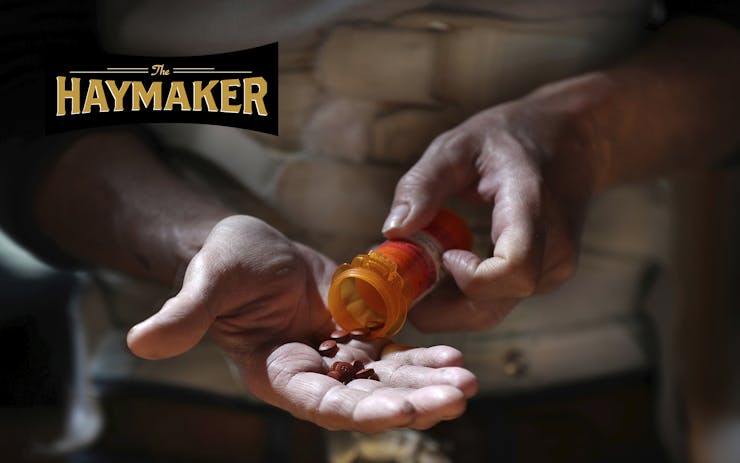‘The Haymaker’ is Leafly Deputy Editor Bruce Barcott’s weekly column on cannabis politics and culture.
Today is International Overdose Awareness Day, and, if it’s like any other day, 91 Americans will die from an opioid overdose before the sun rises tomorrow.
Here’s a big secret we should be shouting from the rooftops: Cannabis can help.
Cannabis can help the 2.6 million Americans struggling with opioid addiction. It may even save their lives.
It helps relieve chronic pain. It helps calm seizures. It helps a person get a good night’s sleep. And it can help many of the 2.6 million Americans battling opioid addiction—in fact, it can help save their lives.
That comes as shocking news to some people. The US Attorney General, for one.
“I am astonished to hear people suggest that we can solve our heroin crisis by legalizing marijuana—so people can trade one life-wrecking dependency for another that’s only slightly less awful.” That’s what Jeff Sessions said at a law enforcement gathering back in March.
You may disagree with his opinion. I certainly do. But Sessions speaks for a lot of reasonable, open-minded Americans on this issue.
From Crazy Idea to Common Sense
I don’t think Sessions is open to persuasion. Others are. I think of it as a minor variation of the larger path to legalization, which has eight stages:
- Shock: “Legalize marijuana? Are you crazy?”
- Skepticism: “It’s way too risky. I’m voting no.”
- Wary conversation: “Tell me why you’re for it, you hippie. Are you high right now?”
- Curiosity: “How has it actually played out in Colorado?”
- Neutrality: “I’m a weed agnostic. Not for it. Not against it.”
- Active research: “Did you know Nixon’s own commission called for decriminalization in the 1970s?”
- Agreement: “Okay, okay. I’m voting to legalize. Don’t tell Dad.”
- Advocacy: “This is ridiculous. We need to change the law, like now.”
So it is with the idea that cannabis can be a helping tool for people struggling to overcome opioid addiction. The first reaction is Sessions-ian: “Give cannabis to a heroin addict? Are you nuts?”
The more you look into the idea, though, the more quickly you move through the eight stages.
The Science Behind the ‘Exit’
More and more research is indicating that using cannabis for pain can help prevent opioid addiction before it happens. A 2014 study found that states with legal medical marijuana had 25% fewer deaths from opioid overdose compared to states where MMJ is illegal. Earlier this month, a study in the Journal of Orthopaedic Trauma found that 90% of post-operative patients who used medical marijuana during their recovery believed that it reduced their pain, and 81% believed that it reduced the amount of opioid pain medication they used.
States with legal medical marijuana had 25% fewer deaths from opioid overdose compared to states where MMJ is illegal.
Philippe Lucas, an addiction researcher at the University of Victoria (and vice president of patient advocacy for Tilray, a Leafly sister company), recently wrote in the Harm Reduction Journal that “research suggests that increasing adult access to both medical and recreational cannabis has significant positive impacts on public health and safety as a result of substitution effect.” That is, pain sufferers are substituting cannabis for dangerous opioids from the start; opioid-using patients are reducing their use with the help of cannabis; and addicted patients are using cannabis as a tool to achieve higher rates of recovery success.
The overlap is obvious and enormous. The vast majority of opioid users rely on opioids to relieve chronic pain. In medical marijuana states, the vast majority of patients cite chronic pain as their qualifying condition. (In states that allow it, that is. Some states still don’t consider chronic pain a qualifier.)
Helping pain sufferers step down from opioids to cannabis is good for many reasons, but the #1 reason is this: 33,091 Americans died from opioid-related overdoses in 2015. (The 2016 estimates are even scarier.) Zero—nada—none—zip—died from cannabis overdoses.
Real Life Experience
That’s the science. The evidence becomes more compelling when you hear the stories of recovering patients.
- Leafly contributor Hayley Fox told the story last month of patients using cannabis as a come-down tool at a Santa Monica, Calif., drug rehab center called High Sobriety.
- Editor Bailey Rahn, who’s been following the emergence of cannabis as an opioid exit, wrote recently about veterans in Santa Cruz, Calif., weaning themselves off the VA’s toxic cocktail of post-deployment drugs with the help of medical cannabis provided by the Santa Cruz Veterans Alliance.
- Photojournalist Charles Mostoller captured the stories of five Americans using cannabis as an opioid exit in a powerful photo essay that ran on our site earlier this week. It’s one thing to consider the “cannabis exit” in theory. It’s quite another to read about cannabis helping real people recover their health and happiness.
Next Step: Cannabis as Medical Assistance
Last month President Trump’s Commission on Combating Drug Addiction and the Opioid Crisis called for the expansion of medication-assisted treatment for opioid addiction. That’s treatment that involves the use of other drugs to help a patient leave opioids.
The President’s commission neglected to include cannabis in the conversation about medication-assisted treatment, despite thousands of letters written in support of the idea. That was hardly a surprise, given that the commission was chaired by New Jersey Gov. Chris Christie, a notorious anti-cannabis hardliner.
Christie, Sessions, and others are fighting a losing battle. Science and real-world experience is running fast against them—just as it is on cannabis legalization. It’s only a matter of time before cannabis-assisted recovery becomes part of the acceptable options for patients nationwide. The only question is how much time. Because we’re losing 91 Americans every day.





